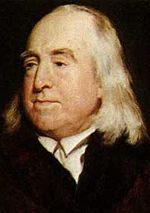Difference between revisions of "Deontological ethics" - New World Encyclopedia
Keisuke Noda (talk | contribs) (importing from wiki) |
Keisuke Noda (talk | contribs) m |
||
| Line 24: | Line 24: | ||
[[Category:Ethics]] | [[Category:Ethics]] | ||
| − | + | [[Category:Philosophy and religion]] | |
| − | [[ | ||
| − | |||
| − | |||
| − | |||
{{Credit|45874207}} | {{Credit|45874207}} | ||
Revision as of 00:37, 5 April 2006
Template:Cleanup-date
Deontological ethics (from the Greek Deon meaning obligation) or Deontology is an ethical theory holding that decisions should be made solely or primarily by considering one's duties and the rights of others. Deontology posits the existence of a priori moral obligations, further suggesting that people ought to live by a set of permanently defined principles that do not change merely as a result of a change in circumstances. One of the most important implications of deontology is that praiseworthy goals can never justify the immoral actions; ends do not justify the means. Deontology is directly in opposition to consequentialism, an ethical theory in which the ends can justify the means because decisions are judged primarily in terms of their consequences.
Proponents of deontological ethics
The most famous deontological theory was advanced by the German philosopher Immanuel Kant. This theory held that particular kinds of acts are morally wrong because they are inconsistent with the status of a person as a free and rational being, and thus should not be carried out under any circumstances whatsoever. Conversely, acts that further the status of people as free and rational beings should always be carried out, under any circumstances whatsoever. A course of action that should always be carried out is called a categorical imperative. Kant developed three formulations of the categorical imperative:
- Act only according to that maxim by which you can at the same time will that it would become a universal law.
- Act in such a way that you always treat humanity, whether in your own person or in the person of any other, never simply as a means, but always at the same time as an end.
- Act as though you were through your maxims a law-making member of a kingdom of ends.
Other examples of deontological theorists include the English philosopher John Locke and the modern-day philosopher John Rawls. Locke held that individual persons have rights that are part of the natural law of the world, and that actions (including the death penalty he advocated) can be judged as right or wrong based on whether they respect these rights. John Rawls clarified the meaning of deontology by explaining the distinction between the right and the good. Whereas consequentialist theories argue or assume that an act is right (and should therefore be carried out) if it maximizes the good, deontological theories assert that an act can maximize the good yet still be wrong (and therefore should not be carried out) if it violates some deontological principle such as a right or a duty or the categorical imperative.
Criticism of deontology
Many utilitarian philosophers offer interesting critiques of deontology. Jeremy Bentham, an early utilitarian philosopher, criticized deontology on the grounds that it was essentially a dressed-up version of popular morality, and that the unchanging principles that deontologists attribute to natural law or universal reason are really a matter of subjective opinion. John Stuart Mill, who lived in 19th century Britain, argued that deontologists usually fail to specify which principles should take priority when rights and duties conflict, so that deontology cannot offer complete moral guidance.
Shelly Kagan, a current professor of philosophy at Yale University, notes in support of Mill and Bentham that under deontology, individuals are bound by constraints (such as the requirement not to kill), but are also given options (such as the right not to give money to charity, if they do not wish to). His line of attack is to first show that constraints are immoral, then show that options are immoral without constraints. If this reasoning is sound, then it follows that deontology is immoral.
Another, unrelated critique of deontological ethics comes from Aretaic theories, which often maintain that neither consequences nor duties but "character" should be the focal point of ethical theory. The ancient Greek philosopher Aristotle, for example, sought to describe what characteristics a virtuous person would have, and then argued that people should act in accordance with these characteristics.
Credits
New World Encyclopedia writers and editors rewrote and completed the Wikipedia article in accordance with New World Encyclopedia standards. This article abides by terms of the Creative Commons CC-by-sa 3.0 License (CC-by-sa), which may be used and disseminated with proper attribution. Credit is due under the terms of this license that can reference both the New World Encyclopedia contributors and the selfless volunteer contributors of the Wikimedia Foundation. To cite this article click here for a list of acceptable citing formats.The history of earlier contributions by wikipedians is accessible to researchers here:
The history of this article since it was imported to New World Encyclopedia:
Note: Some restrictions may apply to use of individual images which are separately licensed.
